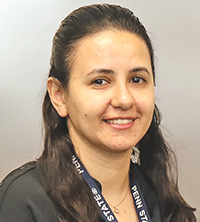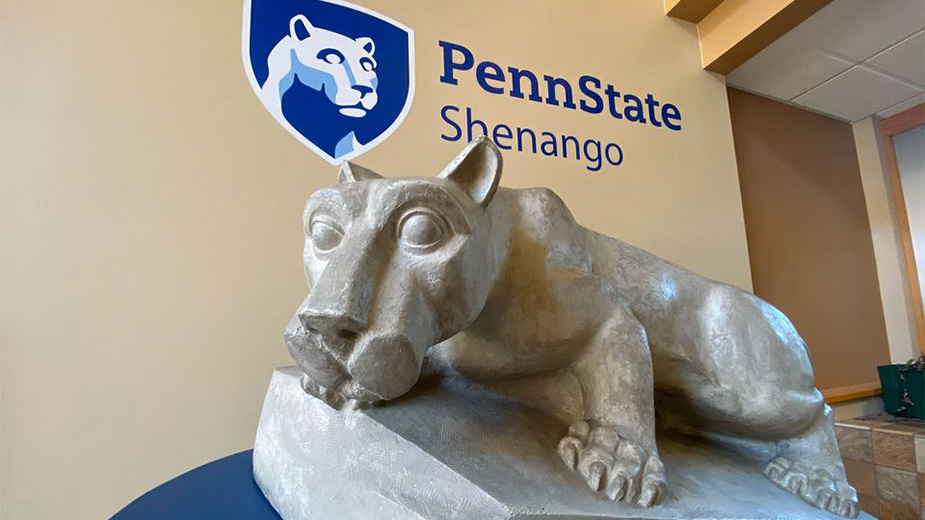SHARON, Pa. – Nestled on the Penn State Shenango campus, the Information Technology Cybersecurity Center program aims to educate and empower future leaders in cybersecurity practices.
Through a four-year program, which includes a lab sponsored by Sharon Tube Co. that opened in April, Penn State Shenango is fostering a culture of continuous learning, ethical responsibility and adaptability.
“The one thing that separates criminals from noncriminals is ethics,” says Matthew DeMaria, coordinator for the Cybersecurity Analytics and Operations program. “In our core values, we instill all the things needed to make sure what we teach is used for good.”

The lab, on the second floor of the Forker building, has been two years in the making. It provides opportunities for students to supplement what they are learning, to create and examine electronics with a digital microscope, collaborate, analyze systems and use 3D printers to create parts. The students can build, experiment to find the vulnerabilities of devices and then work on making enhancements to overcome them.
To keep the university’s system safe from computer viruses, the cyberlab is on a separate network from the Penn State Shenango system.
Not everything in the lab is brand-new, mirroring what students will encounter in the work world.
DeMaria notes students love the hands-on approach and that the program is offered at the affordable Penn State campuses. As part of the Commonwealth Campus system, the program is available through a consortium of 13 of its campuses. This allows them to share resources such as the 25 faculty members. DeMaria says about 70% of the classes are taught at Penn State Shenango and another 30% are shared from one of the other locations.
Most classes have a 15:1 student to instructor ratio. Students are encouraged to intern in the summers to gain more experience.
“The education you get here is no different than the main campus,” DeMaria says, “other than I can say right now, we have better resources in this room.”
This upcoming school year, the program is ready to graduate its first class. The graduates will find jobs are available, many starting at $80,000 to $100,000, according to DeMaria. About 60% are remote, allowing students to live where their dollars will go furthest.
“They will start with one thing and will end up with a totally different thing,” says Dima Rabadi, an assistant professor with the program. Her career evolved from penetration testing in the country of Jordan and then a research position in Singapore before she landed here. “[Students] have to try many different things before they know what they want to do. They can’t know what they don’t like until they try them.”

When she isn’t teaching, Rabadi spends her time analyzing malware in the lab.
“The thing about our major [course of study] that is neat is freedom of movement,” DeMaria says. “And that is you can go down one path and then you find [an] opportunity that interests you. You have the ability to pivot and keep it very interesting.”
DeMaria says he started in IT before cybersecurity was a major issue. He has worked in networking and penetration testing, also known as ethical hacking, where you get paid to be a thief and write long reports. Now, along with teaching, he centers his work on radio wave research.
“We learn about what we know because of research,” DeMaria says. “It’s not just academic research. We have companies doing tons and tons of research in cyber because everything is new. One of the fun challenges we have as instructors is finding the textbooks. Because what we want to teach, by the time it gets printed, is history. It’s no longer relevant.”
Local IT professionals agree it can be difficult for training programs to keep up with the ever-changing field. Avrem CEO Robert Merva notes it is critical for courses to adapt quickly.
In addition to taking classes, getting experience is huge. David Daichendt, vice president of operations at InFinIT, wants people familiar with a wide range of attempted cyberattacks, who know how to use tools to combat them.
“To come out of school and say you’re a cybersecurity expert, I believe you. But what real experience do you have in the field? We love to see experience, somebody who has actually seen it in real time,” says Jason Wurst, vice president of Tele-Solutions Inc., in Youngstown.
Managed-services providers like InFinIT, Avrem and Tele-Solutions Inc. are only part of a vast field open to students.
Rabedi points out not only do small businesses need qualified people, but hospitals, government, insurance companies and banks also want to hire tech people. By example, DeMaria points out PNC Financial Services and FNB Corp. are big employers in the area for cyber professionals.
Google even pays people to find flaws in its system, a freelancing gig known as bug bounty, and infrastructure threats are a top concern on the FBI’s list, notes DeMaria.
The need for businesses to protect themselves continues to grow. DeMaria knows many small businesses struggle to find the resources.
He says half of all small businesses that have been attacked go bankrupt within two years. Last year, cybersecurity, at $1.7 trillion, surpassed drug trafficking at $800 billion, as the No. 1 criminal enterprise in the world.
“This year we saw exponential growth in cybersecurity. Because wherever there is money, there’s going to be bad people trying to get to it. That’s the way it is,” DeMaria says.
Penn State Shenango’s program is geared toward giving students a broad taste of what is out there and allowing them to find their niches. Ideal students like to play video games or do puzzles, DeMaria says, indicators of critical thinking.
“Cybersecurity is so vague and such a big umbrella that we want to foster the students’ creativity and what they want to do,” DeMaria says. “One of the things I’m going to love about this lab is not just seeing what our vision of this lab turned into, but also setting the students loose and seeing what they can create and do. What are they going to come up with and what does their curiosity bring?”
Classes begin in both the fall and spring semesters, he says.
“It’s all about finding a path. Everyone’s path is different and we all have unique ways how we ended up where we ended up,” DeMaria says.
